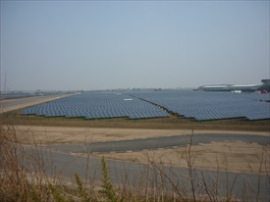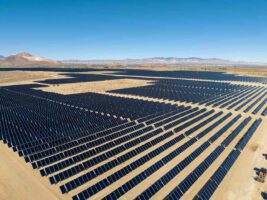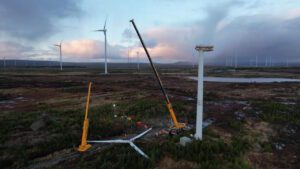Seventy years ago during World War II the Wymeswold airfield in Britain was used to help protect the free world from barbarism of a kind unseen in Europe since the middle ages and of a scale unprecedented in history. Never before was so much owed by so many to so few. And today, when we have the ability to damage our world’s environment on a scale never before seen, the old airbase is being used in the struggle to protect us all from the effects of destabilising climate change.
The site near Leicestershire in the English Midlands is now the location of Britain’s largest solar farm. The facility is 34 megawatts in size and will prevent the emission of approximately 170,000 tonnes of CO2 over its lifespan, which is equivalent to shovelling about 58,000 tonnes of coal back into the ground. An exercise that would no doubt make you wonder why you had bothered to take it out of the ground in the first place.
The solar farm cost just over one pound a watt or $54 million. That’s in either Australian or US dollars as they currently both convert into exactly the same number of British pounds. (No doubt a fun day for currency traders.) This gives a cost of $1.59 a watt and according to a report commissioned last year by the British Government’s Department of Energy and Climate Change, it is 20% less than their figure for large scale solar in 2012. The report also investigated three different scenarios; slow, expected, and rapid decline in solar power costs. The rapid decline scenario had an estimate of $1.60 a watt for this year, so Wymeswold solar farm is definitely on the fast track and indicates that costs are falling in an expeditious manner.
While the price per watt is impressively low, the amount of sunshine in the damp Midlands is also very low and on average a solar panel will only receive the equivalent of 2.84 hours of direct sunshine a day. But even under these dreary conditions solar can produce electricity at low cost. If a 5% discount rate is used for the cost of money, a yearly figure of 1% of the capital cost for operations and maintenance, and with an expected lifespan of 36 years, the solar farm will produce electricity for about 11 cents a kilowatt-hour. If the solar farm was located in a sunnier part of England, say Plymouth in the south, it would produce electricity for around 9.5 cents a kilowatt-hour.
That’s a very good question and I’d like to answer it in three ways:
Firstly, overall the British people give a damn about preserving a stable environment for themselves and future generations. They accept the scientific evidence on climate change and are brave enough not to act like frightened children and not retreat into an imaginary world and pretend that things they don’t believe in cannot harm them. If they have to pay a few cents more to protect the world’s damaged environment they will regard it as a small price to pay.
Secondly, the price of solar electricity has dropped dramatically from what it was. Over the past few years fossil fuel companies have gone from scoffing at it to begging governments to protect them from the big mean solar panels. Further falls in price will come and if solar is put on people’s rooftops for $1.59 a watt it will out compete grid electricity from any source in England and in sunnier countries it can produce electricity at below the wholesale price.
And thirdly, solar electricity is cheap compared to some of the competition. The construction of a new nuclear plant in the UK will apparently not proceed without a guaranteed minimum price of 15 cents a kilowatt-hour.
One interesting thing about Britain’s largest solar farm is the speed with which it was constructed. It was built in less than eight weeks. In comparison, if the UK’s new nuclear plant goes ahead it is not expected to start producing electricity until the early 2020s. Another interesting fact about the Wymeswold solar farm is, despite its name, it has absolutely nothing to do with Hogwarts school of Witchcraft and Wizardry.
Solar farms do have competitors other than nuclear in Britain and the main one is rooftop solar, which is currently more expensive to install but has the advantage of competing with retail rather than wholesale electricity prices. It remains to be seen if one or the other will come to dominate in the future or if they will live together in perfect harmony like the melted cheese and biscuit crumbs on my keyboard. (I really should stop eating while rehearsing but Brahms just makes me so hungry.)
One thing is clear, solar power, whether large scale or on people’s roofs, has a bright future ahead of it. In the Australian Territory capital of Darwin, $1.59 a watt solar would produce electricity at two thirds the current wholesale price and it would equal or beat the wholesale price in many of the world’s sunnier cities. But despite this, you may say to me, “Mr Author, why should we bother with solar power when coal is so cheap and clean and good for the environment and global warming is a hoax started by Svante Arrhenius in 1896 to allow future scientists to get more grant money?”
That’s a very interesting question and I’d like to answer it in two ways. First in normal type, and secondly in italics:
You, sir or madame, are nuttier than a lumpy chocolate bar.
You, sir or madame, are nuttier than a lumpy chocolate bar.
This article was originally published on CleanTechnica. Reproduced with permission








